The education of children with autism spectrum disorder (ASD) is extremely difficult. Especially if autism is still combined with related defects such as mental retardation and sensory disorders.
Education of children with ASD is based on structural chemistry learning based on cognitive behavioral therapy.
Structural chemistry learning depends on these points:
–Respect the individuality of the child
–It is based on characteristics and uses the strengths of the child
–Reduces cognitive impairment caused by autism spectrum disorder
–Increase flexibility of thinking
–With motivation, it builds desirable behaviors and destroys negative behaviors.
–Strong collaboration with family
–The child is supported by the development of communication, socialization and self-care
There are three stages of learning itself.
- Individualization– Children have different symbols and can not concentrate on anything. Therefore, it is necessary to choose in detail a sophisticated selection of methods and procedures, such as customized environments, customized communication and ways of motivation. For students with PAS, the usual curriculum and standard teaching procedures are not completely applicable, so it is necessary to develop an individual educational plan for each student, based on special needs.
- Structured – That is, there are clear rules, the visibility of a set of actions, the placement of the environment. This is because autistic children are not able to navigate time and space without help, and the placement of environment, time and activity allows them to navigate.
- Visualizations – The form of visual support helps students navigate. The visualized information allows for structuring. Visual information is easy to understand and clarifies verbal information, thereby developing independence and resistance to change. It should be adjusted according to individual needs. For example, in the case of related disorders, tactile, that is, tactile visualization is necessary.

Of course, the education of people with PAS does not end after graduation, but lifelong learning is necessary for the development and maintenance of skills.
.